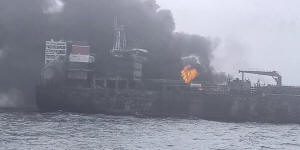The UK fears environmental damage as ships burn after North Sea
collision
[March 11, 2025]
By JILL LAWLESS
LONDON (AP) — British officials were concerned about possible
environmental damage Tuesday and looking for answers a day after a cargo
ship carrying a toxic chemical hit a tanker transporting jet fuel for
the U.S. military off eastern England, setting both vessels ablaze.
Jet fuel from a ruptured tank poured into the North Sea after the
Portugal-registered container ship Solong broadsided the U.S-flagged
tanker MV Stena Immaculate on Monday. The collision sparked explosions
and fires that were still burning 24 hours later.
British government minister Matthew Pennycook said it was a “fast-moving
and dynamic situation.”
He said air quality readings were normal and the coast guards “are
well-equipped to contain and disperse any oil spills,” with equipment
including booms deployed from vessels to stop oil spreading, and
aircraft that can spray dispersants on a spill.
The collision triggered a major rescue operation by lifeboats, coast
guard aircraft and commercial vessels in the foggy North Sea.
All but one of the 37 crew members from the two vessels were brought
ashore in the port of Grimsby, about 150 miles (240 kilometers) north of
London, with one hospitalized. One crew member was missing, and the
coast guards suspended the search late Monday.
U.K. Marine accident investigators have begun gathering evidence of what
caused the Solong, bound from Grangemouth in Scotland to Rotterdam in
the Netherlands, to hit the stationary tanker, which was anchored some
10 miles (16 kilometers) off the English coast.

The investigation will be led by the U.S. and Portugal, the countries
where the vessels are flagged.
The 183 meter (596 foot) Stena Immaculate was operating as part of the
U.S. government’s Tanker Security Program, a group of commercial vessels
that can be contracted to carry fuel for the military when needed. Its
operator, U.S.-based maritime management firm Crowley, said it was
carrying 220,000 barrels of Jet-A1 fuel in 16 tanks, at least one of
which was ruptured.
[to top of second column]
|

In this image taken from video provided by Denys Mezentsev, rescue
crews work on site after a cargo ship was hit by a tanker carrying
jet fuel for the U.S. military off eastern England, Monday, March
10, 2025, setting both vessels ablaze and sending fuel pouring into
the North Sea. (Denys Mezentsev via AP)

The company said it was unclear how much fuel had leaked into the
sea.
The Solong’s cargo included sodium cyanide, which can produce
harmful gas when combined with water, according to industry
publication Lloyd’s List Intelligence. It was unclear if there had
been a leak.
Greenpeace U.K. said it was too early to assess the extent of any
environmental damage from the collision, which took place near busy
fishing grounds and major seabird colonies.
Environmentalists said oil and chemicals posed a risk to sea life
including whales and dolphins and to birds, including puffins,
gannets and guillemots that live on coastal cliffs.
Tom Webb, senior lecturer in marine ecology and conservation at the
University of Sheffield, said wildlife along that stretch of coast
“is of immense biological, cultural and economic importance.”
“In addition to the wealth of marine life that is present all year
round, this time of the year is crucial for many migratory species,"
he said.
Alex Lukyanov, who models oil spills at the University of Reading,
said the environmental impact would depend on multiple factors,
including “the size of the spill, weather conditions, sea currents,
water waves, wind patterns and the type of oil involved.”
“This particular incident is troubling because it appears to involve
persistent oil, which breaks up slowly in water,” he said. “The
environmental toll could be severe.”
All contents © copyright 2025 Associated Press. All rights reserved |